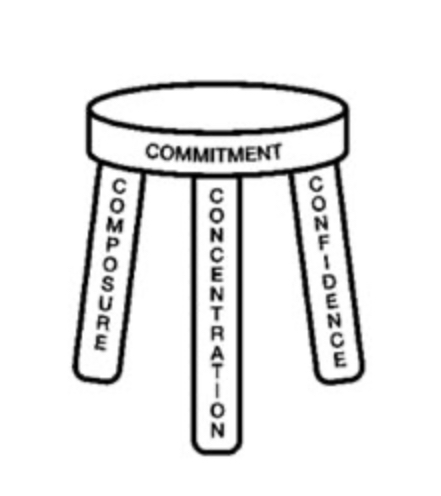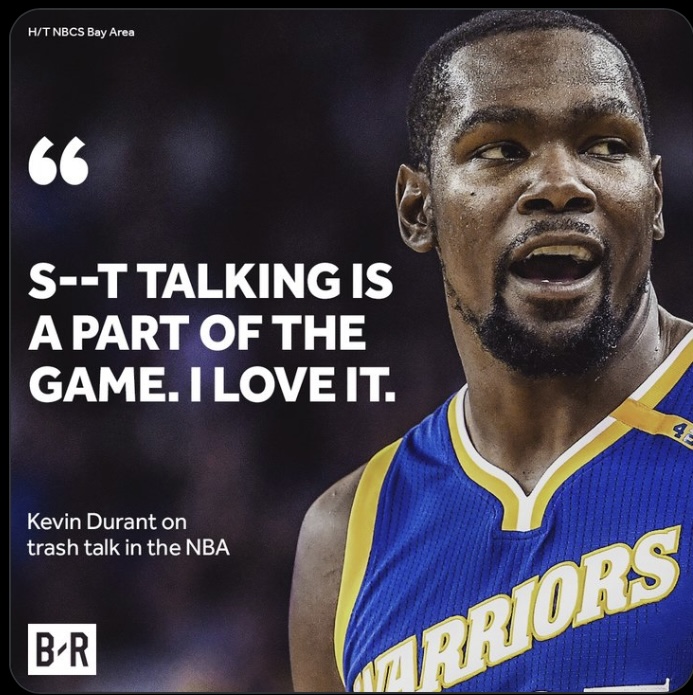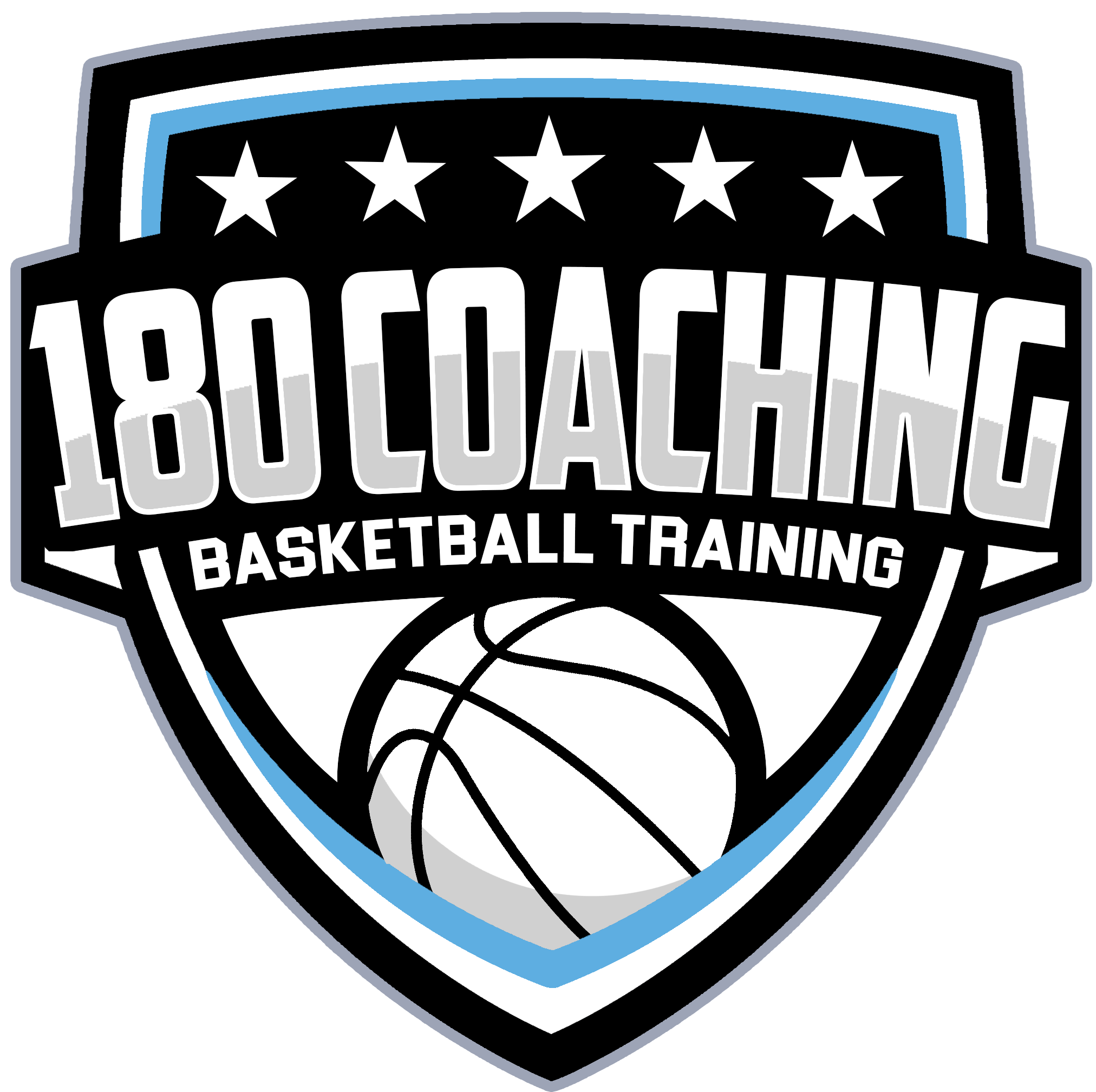Published 3/15/2022
Shooting a basketball requires mental toughness. I’ll explain what mental toughness is, how it’s developed through trash talk, and what life lessons it may teach you.

According to Dr. Spence Wood from Iceboxathlete.com Mental Toughness can be defined by the 4 C’s which are.
COMPOSURE
CONCENTRATION
CONFIDENCE
COMMITMENT

COMPOSURE
Talking trash helps build your composure on the basketball floor. Everyone plays his or her best at certain emotional level. Determining where that level is and what triggers your emotions to sway up and down is where the trash talking comes into play. First you need to think of a time when you had a great game. Where was your emotional control on a scale of 1 to 10 with 1 being Low and 10 being maximum hype level. Everyones number will be different but whatever number it is, the main purpose of composure is to keep you at that perfect level so that you can play at your best. You need to also look for the warning signs that you are below or above your emotional control number. If you are below your number you will start see players making simple mistakes which might include a back court violation, or stepping on the baseline while inbounding the ball on a made basket. These mistake make you shake your head in disbelief based on how stupid they appear to be. On the other hand if you are above your emotional number you will start seeing aggressive mistakes which include over the back, charging or reaching fouls 90 feet away from the basket. Look for these waring signs that you aren’t playing at your ideal emotional number.
Do you Control your Emotions or do your Emotions Control you, is the Life Lesson we learn from having Composure. When you’re under pressure do you get Bitter or do you get Better.
Trash talking helps us gain emotional control by facing it head on in a controlled practice environment. The more your teammates trash talk you in practice the more desensitized to it, you will become. Over time it will have less and less effect on you. By talking trash you will learn to counter it with your verbal judo in order to maintain emotional control. You will also learn what your triggers are that make you loose emotional control. Once you can identify those specific things, the more you can plan to deal with it, and the less impact it will have on you. Players won’t attain composer/emotional control by osmosis they have to be tested under pressure, it is our responsibility to find those real world solutions to empower players to achieve higher levels of composure. Trash talking happens on the court, it happens with opposing fans, it also happens off the court in the game of life. You have to learn to deal with it and not loose emotional control, and great way to do that is to add talking trash to your practices. You gain mental toughness by getting practice on how to manage it without losing control.

CONCENTRATION
Talking trash can help our concentration by allowing us to be in the current moment. When you’re talking trash, you’re not thinking about the past or the future; you’re thinking about the now.
The Life Lesson is the ability to be Present.
Thinking of the past is living life in regret, constantly thinking about what we should or shouldn’t have done serves no purpose. If we concentrate on the last shot we missed we hesitate on taking the next shot. Life’s about taking shots and not concentrating on either the makes or the misses. The point is to keep shooting and not look back. Concentrating on the future is a life living in fear. We need not be fearful of what other would say if the shot doesn’t go in. Or not shooting in fear of losing the big game, these thoughts prevent us from being our best.
It’s not about whether the Shot went in or not, It’s about Did you Take the Shot.
We don’t live in the past or future we live and have control only in the present. Learning how to concentrate and be constantly in the present makes us mental tough. Understanding that in basketball similar to the game of life, opportunities come all the time. You are going to make some shots and you will miss some shots.
The Point isn’t to Concentrate on the Makes or the Misses the Point is when your Moment of Opportunity comes up, Take the Shot!
Learning to concentrate longer is another part of talking trash. An example is the free throw drill I use where you can say anything to distract a player shooting a free throw. The only rules are you can’t touch, or impede, or disrupt their shooting motion. This activity allows participants to focus on shooting while eliminating distractions. It also permits the shooter to employ verbal judo once again to counter the trash talk by verbalizing their go-to statement or other good results. Players also learn to start visualizing them making the free throw before they shoot. This form of concentrating helps clear the mind of distractions. What you want to avoid is thinking of negative outcomes or trying to think about nothing and let any random thought enter your mind. You take a mental rep by visualizing what you want to happen. Taking these mental reps only adds value to your shooting mechanics. Trash talking is a method of assisting players in concentrating by applying pressure and providing a sort of distraction that they would most likely encounter in a real game situation.
CONFIDENCE
First and foremost Confidence comes through skill development and the hard discipline work you put into your game. The more you practice the more confidence you will have. So how does Trash talking relate, to building your confidence? It has to do with learning to ignore the naysayers and not allowing others to put labels on you. People will talk trash and tell you what you can and cannot do in basketball, just as they will in life. Being mentally tough means disregarding other people’s labels and trash talk, understanding that your own belief begins with you.
The Life Lesson is to ignore the Naysayers by Refusing to Accept other peoples Labels.
There will always be those who say you can’t do it. Roger Bannister, the first human to break the four-minute mile, is a famous illustration of this. At the time, no one believed it was possible to run a sub-four-minute mile. Roger, on the other hand, refused to be mislabeled, and on May 6, 1954, he ran a 3:59 mile. Many more runners began to run sub-4 minute miles shortly after he accomplished this. Their lack of confidence and mental toughness had been holding them back. They realized they could do it after seeing Bannister accomplish it. Allowing people to put labels on you is a surefire way to fail.
Finally, tension arises as a result of the disparity between expectations and confidence. Raising your confidence to the level of expectations is one approach to relieve pressure. There is no space for pressure to enter this way. You can also go in the opposite direction and reduce or eliminate expectations entirely. This can be accomplished by concentrating on the process rather than the results. You have control over the amount of effort and time you put into your game, but not over the results. Both tactics can help you gain confidence and mental strength.
COMMITMENT
True commitment entails putting everything on the line verbally, physically, and emotionally. Verbally committed means saying the right things, motivating your teammate making and verbalizing your goals. This also involves committing 100% to talking trash in order to better prepare your self and your team to the challenges ahead. Physically, it means becoming in the best shape of your life and making a commitment to eating, sleeping, and exercising properly. This is a little more difficult than verbally committing everything. Because of their fear of failure and rejection, most individuals do not engage 100 percent emotionally. They do so in order to safeguard their ego and self-worth. Believing that failing or, worse, being rejected would be too upsetting to them. What most people fail to realize is, you will never harm your ego or self-esteem if you risk everything in the goal of being a champion.
The Life Lesson is that when you put Everything on the line, Regardless of the Outcome, your Confidence and Self-Worth will only Grow.
In conclusion in order to be mental tough you need to apply the 4 C’s. How do you apply the 4 C’s you implant trash talking to improve in all four categories. Remembering that in all sports the top level players all talk trash. They do so because there are benefits to it and the byproduct is mental toughness. Michael Jordan, Kobe Bryant, and Larry Bird all talked trash and all were considered to be some of the most mental toughest players of all time. Trash talking has gotten away from crude insults and is more about mental judo. The main objective is to disrupt your opponents Composure, Concentration, Confidence, and Commitment to keep on competing. While at the same time strengthen your 4 C’s. Down below is a link to an article entitled Inside the NBA’s new wave of trash talk: ‘It’s not really a verbal assault like it used to be’
https://www.espn.com/nba/story/_/id/33051655
Ultimately the art of talking trash is way for players to sharpen their minds and get mental tough. Trash talking also allows us to learn valuable life lesson such as.
- Learning how to control your emotions and not have your emotions control you.
- Not focusing on the outcome, but too focus on your opportunity.
- Ignore the naysayers and refuse to accept other peoples labels.
- When you fully commit and put Everything on the line, Regardless of the Outcome, your Confidence and Self-Worth will only Grow.
The Art of Trash Talking is a way to learn useful life lessons and develop mental toughness.
